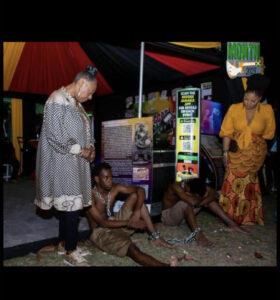
My interest in examining the question of racism in Jamaica is triggered by the public response to the depiction of oppression, using the symbol of chains, and the removal of those chains, which occurred at a recent political meeting of the People’s National Party (PNP). Given that some readers may have seen the video in question, I will summarize the contents and context, especially for those who saw the contents, but are unaware of the context, and those who may not have seen the video.
Context and Contents
According to Claude Sinclair (alias Big Stone), a Rastafarian, who wore the chain, he is a long-time supporter of the PNP, and he wore the chain to the event as his own way of calling attention to the harsh conditions in Jamaica over the last seven years, some of which he listed, in an interview with a Gleaner reporter two days after the event. Sinclair stated that it was his hope that a newspaper reporter would have seen him and explored with him why he was in chains. He also stated that he signalled to one of the conference organizers that he wished to have the Party’s president, Mark Golding, remove the chains, and that his reason for doing so was that Golding is seeking to become Prime Minister and thus, in that capacity it will be his duty to address the oppressive conditions which he has sought to depict using the chains. The high point of the video was when Golding removed the chains from Sinclair’s neck.

According to Claude Sinclair (alias Big Stone), a Rastafarian, who wore the chain, he is a long-time supporter of the PNP, and he wore the chain to the event as his own way of calling attention to the harsh conditions in Jamaica over the last seven years
Mixed reactions
The video has evoked mixed reactions with some people saying that it reflects disrespect for the Jamaican people. The government, through the minister with responsibility for culture, Olivia Grange, has gone as far as calling on Golding to apologize for the video. According to Grange, Golding pulled Sinclair onto the stage, “while laughing and having a jolly good time” and (in removing the chains) “positioned himself as the main character and chief arbiter on the issue of whether a black man is freed”.
There are, however, several people who have insisted that the skit’s depiction is an accurate reflection of the realities in Jamaica. But more importantly, Sinclair’s account (summarized above) of what occurred is most authoritative. He said he was dramatizing conditions in Jamaica over the last “seven years”.
People are at liberty to agree or disagree with Sinclair’s arguments and choice of the chains, and his decision to reference the last seven years (which is the approximate period in which Andrew Holness has been Prime Minister). Whether one agrees or disagrees with him, it is inaccurate and disingenuous for the government spokespersons and others to argue that the scene was a depiction of Golding as the rescuer from slavery. Rather, according to Sinclair who wore the chains, he sought to highlight the responsibility that Golding will have in addressing issues facing the country, were he to win in the General Elections.
People are at liberty to agree or disagree with Sinclair’s arguments and choice of the chains, and his decision to reference the last seven years (which is the approximate period in which Andrew Holness has been Prime Minister).
Racism the underlying issue
I suggest that racism and racially charged politics constitute the motivation of the reaction of the governing Jamaica Labour Party (JLP), and others who, in my view, are affected by unconscious racism. Racism is defined as discrimination or antagonism by an individual, community, or institution against a person or people, based on their ethnicity or ethnic group. The statement of Grange reflects antagonism, and the hasty way the government penned that extensive response reflects the depths of the antagonism.
Grange’s statement, however, which was a full-throated commentary on slavery, is completely at odds with Sinclair’s account of his intentions. While Sinclair gave an account of his intent two days later, and thus Grange and others may be forgiven for their misreading of what was intended, Grange’s statement is flawed and over the top, even if it were a slavery scene that was being depicted and the flaws in her statement bore all the markings of racism and contrived racially charged politics – a matter to which I will return.
In taking the view that the depiction represented a slavery scene (not the oppression Sinclair intended), Grange in questioning the role of Golding called for an apology from Golding. Now that Sinclair has, articulately stated his intentions, should not Grange consider apologizing to both Sinclair and Golding for her gross mischaracterization? Such an apology would be justified because the premise of her statement was incorrect.
But even if the depiction was about slavery, what would be wrong with Golding playing the role of an abolitionist? It is Grange’s insistence that Golding would be ill-suited for that role that constitutes racism, in my view.
But even if the depiction was about slavery, what would be wrong with Golding playing the role of an abolitionist? It is Grange’s insistence that Golding would be ill-suited for that role that constitutes racism, in my view.
Grange wrote in part:
“My heart sank as I remembered the ancestors who were similarly treated as they endured hundreds of years of unspeakable oppression and brutality perpetrated by white colonial enslavers”.
In seeking to tie Golding to white colonial enslavers, Grange exposes the obvious racial element in her position. This racial element would be forgiven if it were the case that since the end of slavery unspeakable oppression and brutality have not been perpetrated against black and poor Jamaicans by people in power who are black and white. The history of Jamaica, since independence, as before, has been littered with countless instances of oppression against blacks. Police brutality (which has occurred under both the JLP and PNP) has been perpetuated against blacks. Is it not worth reminding ourselves too that one political leader had said “bring them (the rastas) in, dead or alive”? Are not black youths locked up routinely without charge? Isn’t it the case that the Courts recently have ruled that the government has abused the rights of citizens (mainly blacks) under the States of Emergency?
Thus, while the history of colonialism was largely white oppression, a government which has itself committed acts of oppression against its people is morally barred from seeking to take a high ground, given that the segment of the population that has faced most oppression and lack of opportunity based on its policies are blacks. That should make all hearts sink.
Another racial message is communicated by Grange when she says:
“At a time when we are demanding that enslavers set things right for the hundreds of years of chattel slavery of our African ancestors, we cannot accept this behaviour from the Leader of the Opposition”.
Among other things, the suggestion is that Golding is to be associated with the enslavers on whom demands are being made to “set things right”. This association is flawed as it suggests that the mere fact of his being white makes Golding one of them. It follows then, from Grange’s argument, that all whites are enslavers.
Among other things, the suggestion is that Golding is to be associated with the enslavers on whom demands are being made to “set things right”. This association is flawed as it suggests that the mere fact of his being white makes Golding one of them. It follows then, from Grange’s argument, that all whites are enslavers.
By holding Golding’s skin colour against him, Grange not only does an injustice to Golding, but also perversely misrepresents history, and the role of whites who were actively involved in fighting against slavery, among them William Wilberforce and William Knibb. If people of Caucasian descent have been involved in the abolition of slavery, it is a flawed argument to suggest that it is objectionable for a Jamaican of Caucasian descent to take part in a skit depicting the ending of slavery.


Real politick
The picture below shows Grange at a planned and staged emancipation event with two black boys in chains. Using the argument of Grange and others, it would be inappropriate for Golding to be in that scene. But would such an argument be reasonable, and on what basis?

I see nothing wrong in the scene above. But what if a person, of any skin colour, were directly involved in acts of whether oppressing or abusing others, would such a person be deemed ineligible to participate in a skit depicting oppression or abuse? What has been Golding’s personal history?
The underlying issue appears to be a political race-baiting agenda in which Golding’s race is being used to tarnish him. That is a textbook definition of racism. I believe that everything about the character and conduct of anyone who seeks public office is fair game but given that racism is a crime (in some countries) or a basis for civil litigation in others, and a recognized immoral act, those who practice racism and race-baiting politics are engaged in manifest injustice and are doing damage to Jamaica and the affected individuals.
The underlying issue appears to be a political race-baiting agenda in which Golding’s race is being used to tarnish him. That is a textbook definition of racism.
Racism has long been present in Jamaica’s politics but was viscerally re-introduced by Minister Nigel Clarke when he labelled Golding “Massa Mark”, who when exposed gave an implausible and detailed defence. The hasty analysis of the skit by Grange, which was completely unfounded, given the intent of the initiator, reflects the government’s continued politicization of race. This practice is wrong and should be condemned.
Multiple areas of manifestation
The political arena is not the only one in which racism is practised in Jamaica, and the concerns of many people (both Jamaicans and non-Jamaicans) have been well documented. A Google search on the issue returns thousands of entries. Some of these accounts document people’s experiences with either subtle or overt racism, including in the tourism and personal care sectors where allegations exist of black Jamaicans and black visitors being treated differently than whites (local or foreigners) at establishments, and in some cases barred.
Political leaders have a duty to eliminate and prevent these forms of human mistreatment and thus when they instead accentuate and stoke it, they are undermining the foundations of the society they are leading, or seeking to lead.
While racism in Jamaica exists outside the political arena, its proliferation is certain when leaders use racist language. It was found that anti-immigrant behaviours increased during the Trump presidency and were deemed to be a result of his language. Just before going to press with this article, I was sent a video with a JLP candidate calling Mark Golding “red boy” and in lock step with the language of Minister Clarke during his infamous Massa Mark closing budget presentation, the man used other words used by Clarke, “it bun dem”. Our political discourse needs to be rescued from many things, including racism.
Canute Thompson is Professor of Educational Policy, Planning and Leadership and The University of the West Indies, Mona Campus, a social activist, and author of eight books and eighteen journal articles. His academic achievements include:
- Two Principal’s Awards in 2023 for research activity generating the most funds, and research activity with the most development impacts, serving as Project Director for a project executed by the Caribbean Centre for Educational Planning.
- A 2022 Bronze place winner in the Independent Publisher Book Awards for his book, Education and Development: Policy Imperatives for Jamaica and the Caribbean.
- A 2021 finalist in The Vice-Chancellor’s Award for Excellence for all-round excellent performance in Outstanding Teaching, Outstanding Research Accomplishments, Outstanding Service to the University Community, Outstanding Public Service.
- A 2021 Principal’s Award for Most Outstanding Researcher.
- Two Principal’s Awards in 2020 for Most Outstanding Researcher and Best Publication for his book, Reimagining Educational Leadership in the Caribbean.

Excellent article very precise,and to the poi t
Thank you for your feedback
Pingback: JAMAICA | Removing the 'chains of oppression' - Racism in Jamaica | Village Voice News
Very profound indeed. This is just a matter again, of the ruling party highlighting trivialities to side step major issues.
Thanks for engaging Mrs Griffiths-McKenzie.